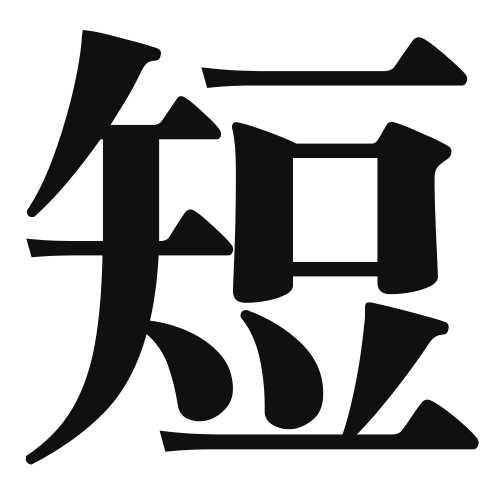1. Overview of Meaning
The kanji “短” (pronounced “tan”) means “short” or “brief.” It is used to describe something that has a small length, duration, or extent.
2. Formation and Radical
The kanji “短” is a compound character (会意文字) that combines two elements: the radical “刀” (meaning “sword” or “knife”) on the left, which often relates to cutting, and the character “旦” on the right, which can imply the concept of dawn or day. Together, they convey the idea of something being cut short.
The radical of “短” is “刀,” which signifies its connection to the concept of cutting or shortening.
3. Examples of Usage
Common words and phrases that include “短” are:
- 短い (みじかい, mijikai) – short
- 短時間 (たんじかん, tanjikan) – short time
- 短編 (たんぺん, tanpen) – short story
Example sentences in daily conversation:
- この映画はとても短いです。 (このえいがはとてもみじかいです。) – This movie is very short.
- 短時間で終わります。 (たんじかんでおわります。) – It will finish in a short time.
4. Synonyms and Antonyms
Similar kanji with related meanings include:
- 小 (しょう, shou) – small, which refers to size rather than length.
- 少 (しょう, shou) – few, which refers to quantity.
Antonyms of “短” include:
- 長 (ちょう, chou) – long, which indicates a greater length or duration.
5. Cultural and Historical Background
The kanji “短” is often used in Japanese culture to express brevity, which is valued in various contexts, such as literature and communication. For example, short stories (短編) are a popular literary form.
Proverbs and idiomatic expressions that include “短” are:
- 短気は損気 (たんきはそんき, tanki wa sonki) – “A short temper leads to loss,” emphasizing the importance of patience.
